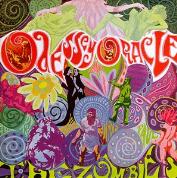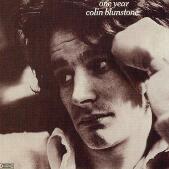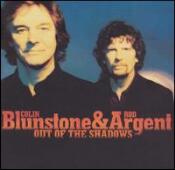Circling Back Around: An Interview With Colin Blunstone of The Zombies
by scott homewood
Editor’s Note: As you can tell from the references to February, this interview was written previous to then and is just being published now.

Some people are always stressing, always worrying about "what if" and trying to avoid getting caught in the same circles over and over again. Even rock legends like Colin Blunstone, one-time lead singer for British Invasion band The Zombies and currently reunited with Zombie-mate Rod Argent, gets caught up in endless circles once in awhile. In Blunstone's case, though, they are often to his benefit. Reunited with old pal Argent, the pair has created several new records and will actually tour the US for only the second time in many, many years. The tour will touch down in Charlotte on February 17 at Amos' Southend. Knowing the enormity of this event and also being a huge fan of Blunstone's ethereal voice, I decided it was a good time to interview him about his extraordinary up-and-down career.
And, believe me, the phrase "up-and-down" is putting it mildly. Only Colin Blunstone knows the bittersweet feeling of having a Top 5 single in the United States ("Time of The Season") while working at a job selling insurance in Britain. After several years (‘64-'67) of having hits with classic songs like "She's Not There" and "Tell Her No" the band had recorded their masterwork, Odessey and Oracle, only to have it fall on uninterested ears. Languishing in Britain, the album finally came out in the States a full year later almost as an afterthought, and long after the band had broken up. By pure luck, "Time of the Season" began to get airplay and became a monster hit in the summer of 1969
"That was definitely a weird time for us," Blunstone said. "It's great that people talk about Odessey and Oracle now, respect it as a great album, but the lack of success of that album was a big factor in breaking us up. Now, let me tell you, if you talk to any of the other people in the Zombies, you'll get a different answer but, for me, I feel that the album was a completion of a circle for us, a culmination of what we could do as a band. The respect people show for it also makes me feel as if we were on the right track all along, and that's a great feeling. It's definitely a vindication for the band because we always thought it was good."
Humble statements like "on the right track" and "good" are definitely putting it mildly and are a perfect example of classic British understatment. Although ignored at the time for being too adventurous, Odessey and Oracle is now deservedly regarded as a landmark album, and not just because its' hit single has endured as a bonafide classic. The album as a whole is a shining example of psychedelic pop and is on a par with the Beatles' Sgt. Peppers' and the Beach Boys' Pet Sounds. But, despite the accolades the album gets now, the long overdue praise adds a melancholy element Blunstone will never totally shake.
"I am definitely an "if only" type of person," Blunstone said. "Even though I just said to you, and maybe rightly so, that it has a bit of a feel of a proper ending, a proper completion, the culmination of a circle, so to speak - I also feel that it could have maybe been a new beginning for us if we'd have stuck together. We had just left our previous producer and had gotten (fellow Zombie) Chris White to produce and if we would have continued in the direction we went with that album, there's no telling what we could have done, what new areas we could have explored."
As of that point, though, the band had split up and White and Rod Argent (both of whom wrote the Zombies' hits) started working together to form a new band, Argent. Blunstone, seemingly fed up with the music business, went back to the insurance business, which he had worked in before joining the Zombies. Due to the success of "Time of the Season," though, Blunstone began to have second thoughts about abandoning music and began a solo career in the early 1970s.
 Like the Zombies' career trajectory, Blunstone's solo career
started out strong but eventually hit a rough patch. His debut solo album was called One Year, so named because it
took one year for Blunstone to put it together. In the process, Blunstone
enlisted help from his old Zombie buddy Rod Argent and used a few songs left
over
from the Zombies' last sessions. Besides being a vibrant album blending
classical music with pop songwriting structures, it also was special for being
the
first album to contain songs written by Blunstone himself. In fact, Blunstone
wrote a hit right out of the gate with the song "Caroline Goodbye" and also had
another hit with the song "Say You Don't Mind" written by former Moody Blues
leader and future Wings member Denny Laine.
Like the Zombies' career trajectory, Blunstone's solo career
started out strong but eventually hit a rough patch. His debut solo album was called One Year, so named because it
took one year for Blunstone to put it together. In the process, Blunstone
enlisted help from his old Zombie buddy Rod Argent and used a few songs left
over
from the Zombies' last sessions. Besides being a vibrant album blending
classical music with pop songwriting structures, it also was special for being
the
first album to contain songs written by Blunstone himself. In fact, Blunstone
wrote a hit right out of the gate with the song "Caroline Goodbye" and also had
another hit with the song "Say You Don't Mind" written by former Moody Blues
leader and future Wings member Denny Laine.
Typical of Blunstone's career, these hits were only in Britain. With the demise of the Zombies also came the demise of Blunstone's chances of having a hit in the States. Blunstone's blend of classical music and prog rock leanings teamed with his angelic vocals were not catching the ears of US rock fans, who were busy with hard metal ala Led Zeppelin or the folk-rock of Crosby, Stills and Nash. While Blunstone's music contained some of both of these disparate elements, his music was an amalgamation of the two, and therefore, harder to categorize making radio airplay difficult to attain.
Blunstone's next solo album Ennismore was a departure for the singer, featuring less classical elements and highlighting a more romantic soft rock sound. Although different in sound, vision and texture Argent was again on board to lend help via his musicianship and songwriting. This time, Blunstone scored a UK hit with the song "I Don't Believe In Miracles," written by Russ Ballard. It was to be his last hit for quite a while, the beginning of a long, drawn out slow period for Blunstone and his music.
By this time Argent and White were going full bore with the band Argent, and had their own hits like "Hold Your Head Up" and "God Gave Rock And Roll To You." For a while, Argent just didn't have time to work on any more of Blunstone's records. Everything seemed to be grinding to a halt.
"In 1974 I just stopped touring," Blunstone said. "I think I was just tired of it. Back then, you didn't just tour to promote an album. You toured all the time and I was on the road nonstop for a long time and I just stopped. I think I just wanted to rest. I kept working, making albums, I just didn't tour."
Although the solo albums kept coming, the results were not what Blunstone's fans were looking for, at least according to the disappointing sales and lack of hits. During this slow time, another old friend came back into Blunstone's preverbial circle to help re-ignite Blunstone's career.
"When the Zombies were putting together Odessey and Oracle at Abbey Road Studios, Alan Parsons was working as an engineer there, " Blunstone said. "When Alan began to get his own thing together almost a decade later, he remembered me and rang me up and used me as one of the vocalists on his albums. I was supposed to be on the first record but ended up not being on it, a scheduling conflict or something. I eventually did five others though, some of what I consider to be a some of my best work."
While just one of some five or six vocalists used on Parson's recordings, the songs with Blunstone on vocals are often touted by Parson's fans as being the best songs of the particular albums they're featured. Blunstone and Parsons managed to score a hit with the song "Old and Wise" in the UK but, in the US, all of Parson's hits featured other singers.
Even though he was virtually forgotten stateside, the Parsons hit in the early ‘80's and a few subsequent UK hits with Motown remakes kept his name alive, albeit just barely - a shame for an artist with such a distinctive and haunting voice at the peak of its' powers. Still, even though Blunstone took a hiatus from recording solo albums, projects did occasionally pop up. "Eric Wolfson was the partner with Parsons on the Parsons Project albums and eventually he got tired of not being able to tour, " Blunstone said. "What we ended up doing was using a bunch of the musicians from Parson's albums and created a band called Keats. I was the lead singer and we put out an album that is really, really good. The project ended up stopping because we never ended up touring. All of those guys were very in-demand session guys and there were always scheduling conflicts. Since we formed because we wanted to tour and couldn't there was no sense keeping Keats going." Even though Keats became another stalled project and garnered no hits, it managed to keep Blunstone's career going, almost despite itself.
After a few years of relative quiet, the next big highlight of Blunstone's career came during a project which began simply as more of a knock-off thing, re-recording his old hits for a new label. Thankfully, another ex-Zombie friend Chris White re-entered Blunstone's circle and helped turn the album into a major milestone in Blunstone's career. While most re-recordings are shady deals done just for the quick money gained from tricking casual fans, Blunstone and White decided that if they were going to re-record old songs, they would use as many of the original backing musicians as they could. So, on the Zombies' songs, Argent and a few Zombies were brought back in. On the solo hits remakes, some original musicians were used. It ended up being a truly novel idea and a great way to kick off Blunstone's most productive decade in twenty years as the ‘90's saw the release of several new solo records and many "lost tracks" were released featuring Blunstone with and without the Zombies.
Currently, Blunstone's career seems to find him coming around again in one of those circles he seems to always inhabit. In 1997, after working closely with Argent on the Zombie Heaven box set, Blunstone and Argent found themselves performing together at various charity events and one-off gigs all over Britain. "We were at this charity gig, actually we played a few duo acoustic gigs to promote the box set, but we were at this charity thing," Blunstone says, "and we decided to get up and play a few songs. Now, the band hadn't played together in a while and we hadn't rehearsed - so we were kind of looking at each other to see what we should do. But after a few seconds, it felt like it was thirty years ago, which was the last time we had ever played together, and it clicked as if we had never stopped."
This gig, together with a renewed confidence and desire to re-emerge as a force in the music business again on a world-wide scale, started the ball rolling for Blunstone's career renaissance. "Actually, it was Rod Argent and a musician named Don Airey who got me back into playing live again, after many years of just doing albums, maybe a gig here or there," Blunstone said. "Airey's worked on a few of my albums, "The Light Inside" and some others, worked with Oxxy and Deep Purple and between his encouragement and working with Rod (Argent) on some projects regarding the Zombies it felt right to start performing live again. I had always worked on various recording projects, but I hadn't really toured since 1974. After these charity gigs, I ended up ringing Rod to see if he wanted to play live again on a more permanent basis and we both felt there would be an audience for what we do."
 Luckily for Blunstone's fans, Argent was ready. But not just to
play live.
"Argent had some tracks he had been working on and I went over to
see if I could put my vocals on them," Blunstone said. The resulting album,
last year's Out Of The Shadows, was the first album featuring the two
together in over twenty years. It seemed only right to the both of them that
they
should mount a tour to promote the album.
Luckily for Blunstone's fans, Argent was ready. But not just to
play live.
"Argent had some tracks he had been working on and I went over to
see if I could put my vocals on them," Blunstone said. The resulting album,
last year's Out Of The Shadows, was the first album featuring the two
together in over twenty years. It seemed only right to the both of them that
they
should mount a tour to promote the album.
Tour they did. And, for the first time in many years, Blunstone and Argent decided they wanted to conquer America again, as they had with the Zombies. So, in 2003, fans were treated to the first shows re-uniting the main cogs of the Zombies for the first time in thirty years. "Most people don't realize this, but we never toured behind Odessey and Oracle, so this is the first time they've ever gotten to hear the songs live," Blunstone said. "Especially in America. So what we do is mix a bunch of Zombies songs in, along with my solo hits and a few new ones from the last album and another new album we have coming out this year, which will be our second together since 2000."
Though reunited and regarded as rocking righteously, there have been some of the same familiar glitches Blunstone has had to deal with throughout his career. "Currently, the last album we did, Out of the Shadows, has no label in the US right now," Blunstone said. "We were unhappy with the lack of attention the album got from the label, which was Koch records, and both parties agreed we should part."
As of the time I conducted this interview, their new CD didn't have a US label yet, but according to Blunstone, hopefully that will be ironed out by the time the tour starts in February. All in all, despite the obvious unfortunate obstacles Blunstone has encountered with his career, he keeps pushing and his voice is as strong and beautiful as ever.
A telling sign his fortunes continue to be on the upswing is that the Zombies as a band only lasted for three years but Blunstone and Argent have been working together again for almost twice as long. For Colin Blunstone, getting caught in circles is often the best place to be.
Copyright (c) 2005 erasing clouds |
|